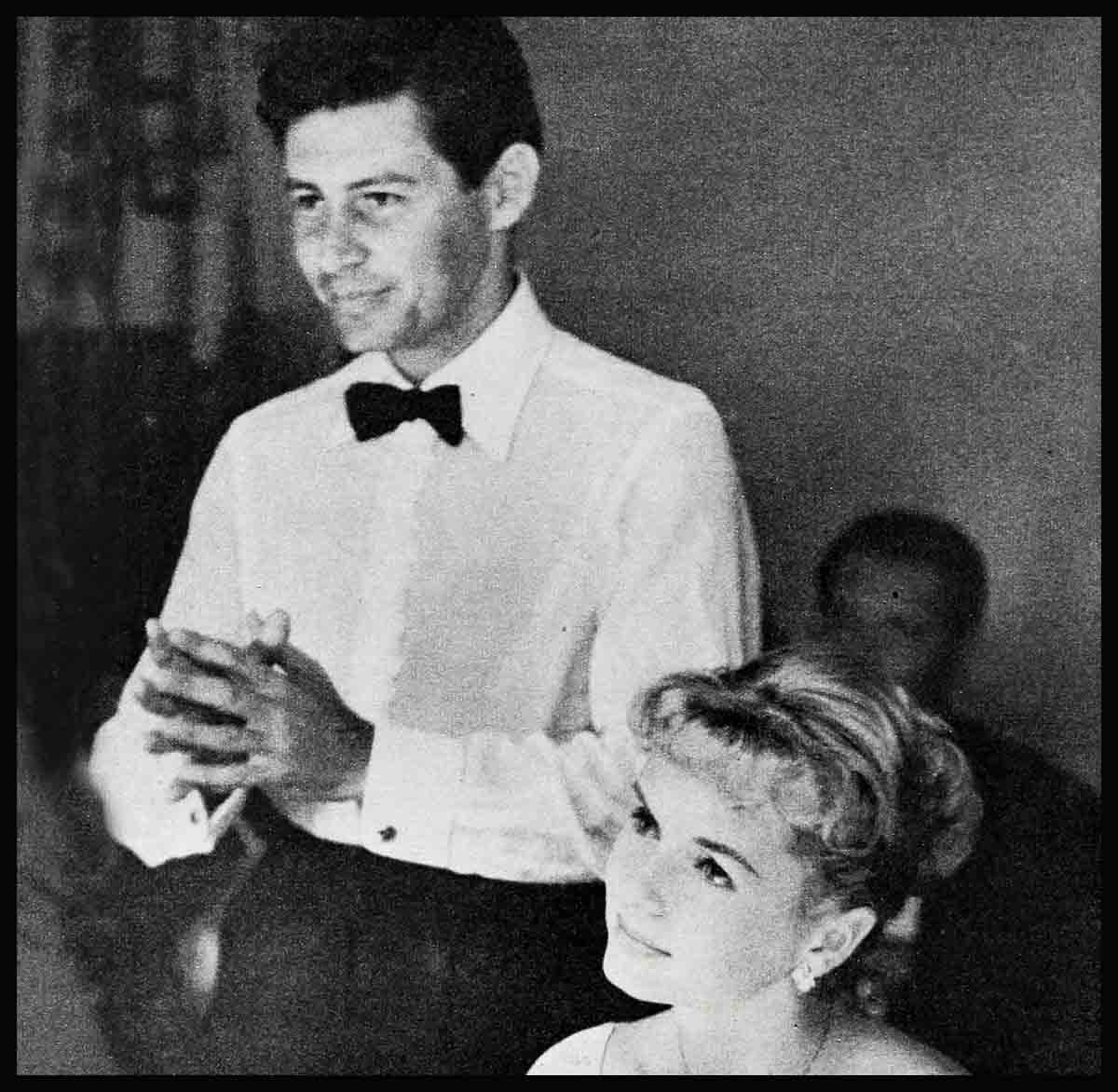
Tragic Triangle—Eddie Fisher
This interview was begun last August. It was never completed. At Hollywood’s Television City the NBC studios were the usual mad-house, but the set where I was to meet and interview Eddie Fisher was bedlam. It was a bedlam because everyone was waiting for Eddie. He was late.
Eddie’s head writer, Mac Benoff, was tearing his hair out and rushing in and out of doors.
“Where is he? Someone find him. How can we rehearse lines if he doesn’t okay them?”
“So start rehearsing,” said the production man.
Benoff turned a charming green.
“They’re Eddie’s lines so naturally it would help if he were here to study them.”
“You still hanging around?” someone grunted at me.
“I’d like to nose around at long as he’s late and get a few quotes about Eddie from some of the people who work with him.”
“Yeah, lots of luck,” came the reply.
The “lots of luck” was tinged with sarcasm.
A harassed young blonde woman walked by with a pile of scripts in hand.
“What do you think of Eddie,” I shouted above the din.
“Eddie who?”
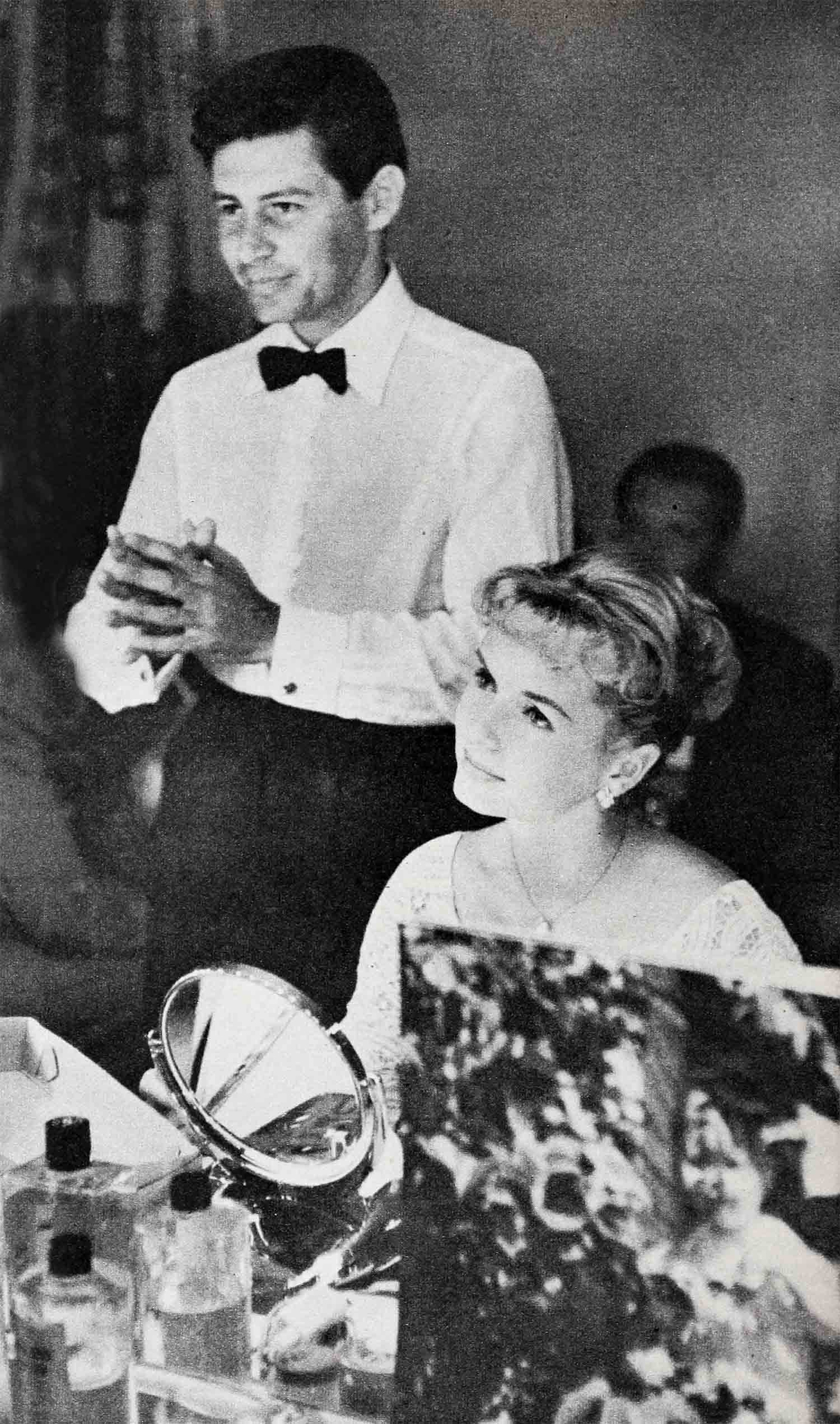
“Eddie, who? Eddie Fisher.”
“Are you a reporter or a writer?” she asked, eyeing me suspiciously.
“That’s right.”
“I think he’s great—just g-r-e-a-t!”
A prop man excused himself as he hauled a large floral-covered trellis past me.
“What’s Eddie Fisher like to work for?”
“Why?” he called, not even stopping.
“Well, I’m doing this story and—”
By this time I had gotten the feeling people were pointing me out—and then avoiding me like the plague. Where people had been bustling around me only a minute before—I was now standing completely alone in the middle of the stage. Even though it was the middle of August I felt a distinct chill.
Bernie Rich, one of Eddie’s oldest and best friends from his Philadelphia days, appeared from somewhere out of the shadows and gently but firmly led me over to a chair away from everyone and everything that was going on.
“Why don’t you wait until Eddie gets here to start your story. I doubt if you’ll get any material from his staff,” he said, somewhat nervously.
I wondered.
“Is Eddie always late?”
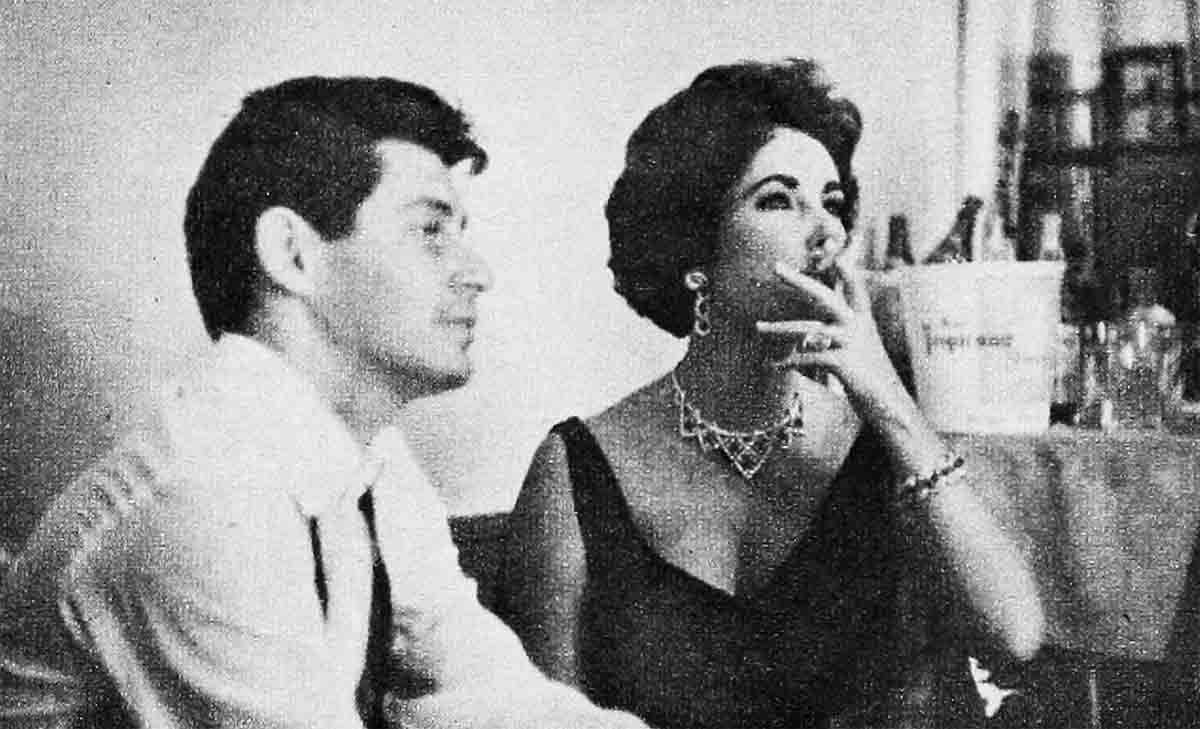
“Well, Eddie has a tendency to moodiness when things aren’t going well with the show or his other enterprises. It’s to be expected. Then, too, Eddie can’t just hop out of bed and race to the set. In the mornings, he’s a slow starter.”
I turned my head just in time to see the star of the show enter a side door. He had to pass directly in front of me to get to where he was heading but I had to do everything but stick out my foot and trip him to get his attention. He seemed to be off in another world.
“Oh the interview—sure—I forgot. I’m sorry,” he stammered as I tried in vain to get him into the chair next to mine.
“I’m really here to find out about the rumors, Eddie. Are you and Debbie having fights, not getting along or—well you know what the gossip has been.”
He looked me straight in the eye.
“You can print it in headlines. I’ve never been happier in my life.”
He walked over to the bandstand and I watched him run through his lines for the next hour.
knew he had been telling me the truth.
I knew it was the truth and yet there were a hundred and one things I wanted to ask. There was something, something I couldn’t put my finger on—something I sensed. I don’t know if I got it from the the people around Eddie—or Eddie himself.
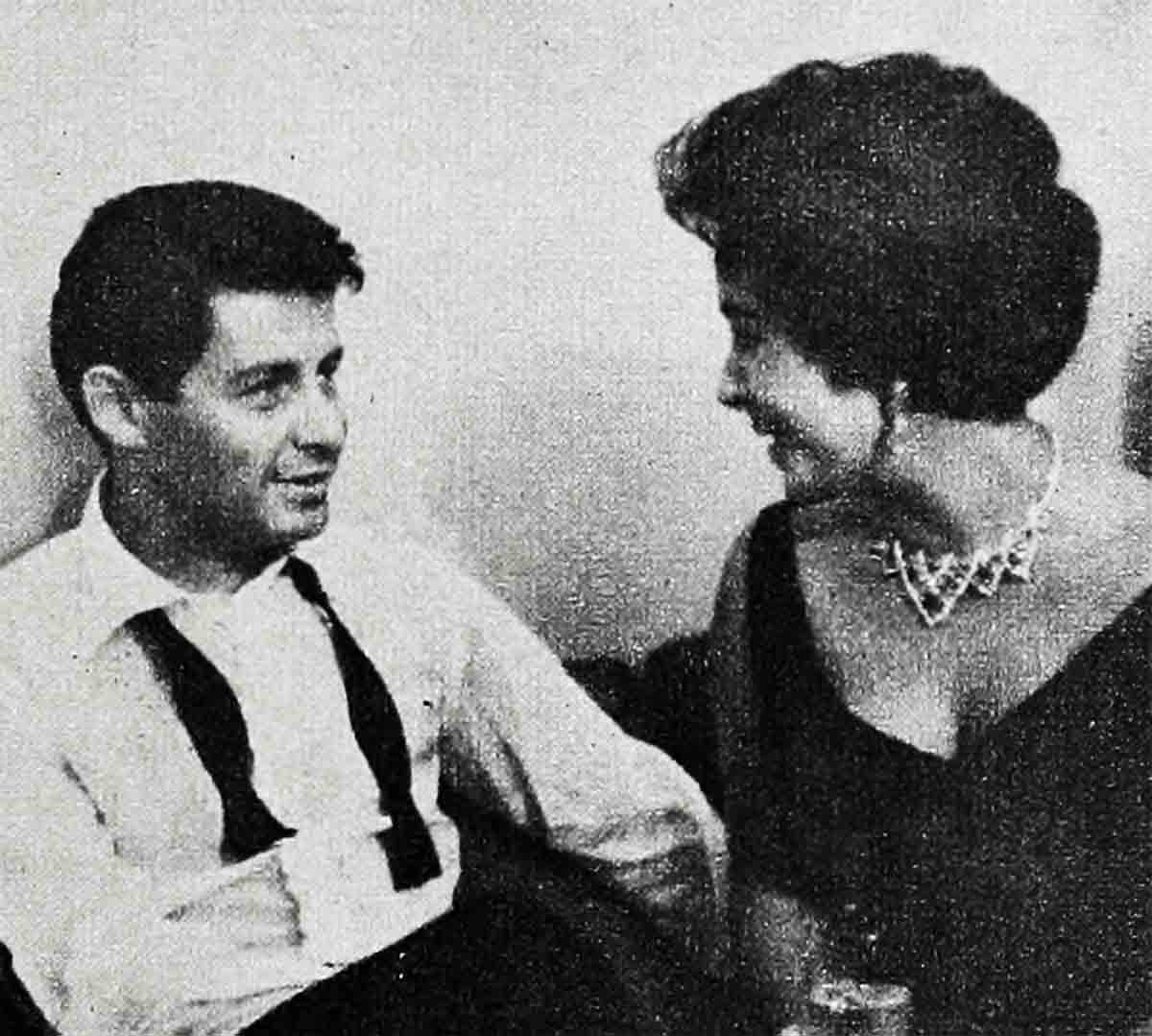
The answer was of course—in Eddie. That made it more difficult.
In spite of all the stories, releases and publicity on him—his kindness, his thoughtfulness, his lighthearted boyishness and everything else that’s been printed, Eddie Fisher is a very complex person.
He doesn’t rave, he doesn’t rant and to the best of my knowledge he’d never pulled any of the usual prima donna stuff so many stars are rightly accused of. But he is difficult in one of the most offbeat ways that a star could be and it might even be called a phenomenon in Hollywood.
When he was a poor boy in Philadelphia, Eddie’s reaction was not to resent the seemingly cold world into which he’d been born but, instead, to win it over. He began by making two friends, Joey Foreman and Bernie Rich, now both Hollywood actors and his closest friends today. Bernie, as a matter of fact, is also associate producer of Eddie’s TV show.
The friendship between Eddie and Joey Foreman is a strong but also a rambunctious one. They have alternately fought and made peace again ever since they have known each other. A battle is followed by an exchange of warm pledges which soon falls into battle again. As a youngster, Eddie once got a sports coat with blue shadow-stripes from Joey. He still has that jacket. Their shoe sizes are the same now and Joey often finds himself in Eddie’s shoes. Joey has always been the larger of the two, aside from shoe size, but as a boy Eddie would never admit this meant he was also the stronger.
One afternoon, when they were twelve, Eddie and Joey began a fist fight at the corner of Sixth and Shunk Streets in Philadelphia. It didn’t end until they were rolling around on the sidewalk and passersby pulled them apart. For a year, they didn’t speak to each other, although they were exchanging lines daily on the same radio show for Skipper Dawes (another old friend who’s now working with Eddie). Then Eddie fell ill and Joey decided that he just had to visit him. When Joey walked into his bedroom, Eddie was so deeply affected that he had to duck under the covers to hide his emotions.
Both Eddie and Joey have been chess players since they were boys and there is nobody they’d rather beat than each other. Nobody, that is, unless it’s Debbie’s father, Ray Reynolds. But with Ray they admit they have no chance. He is the old master of their chess circle.
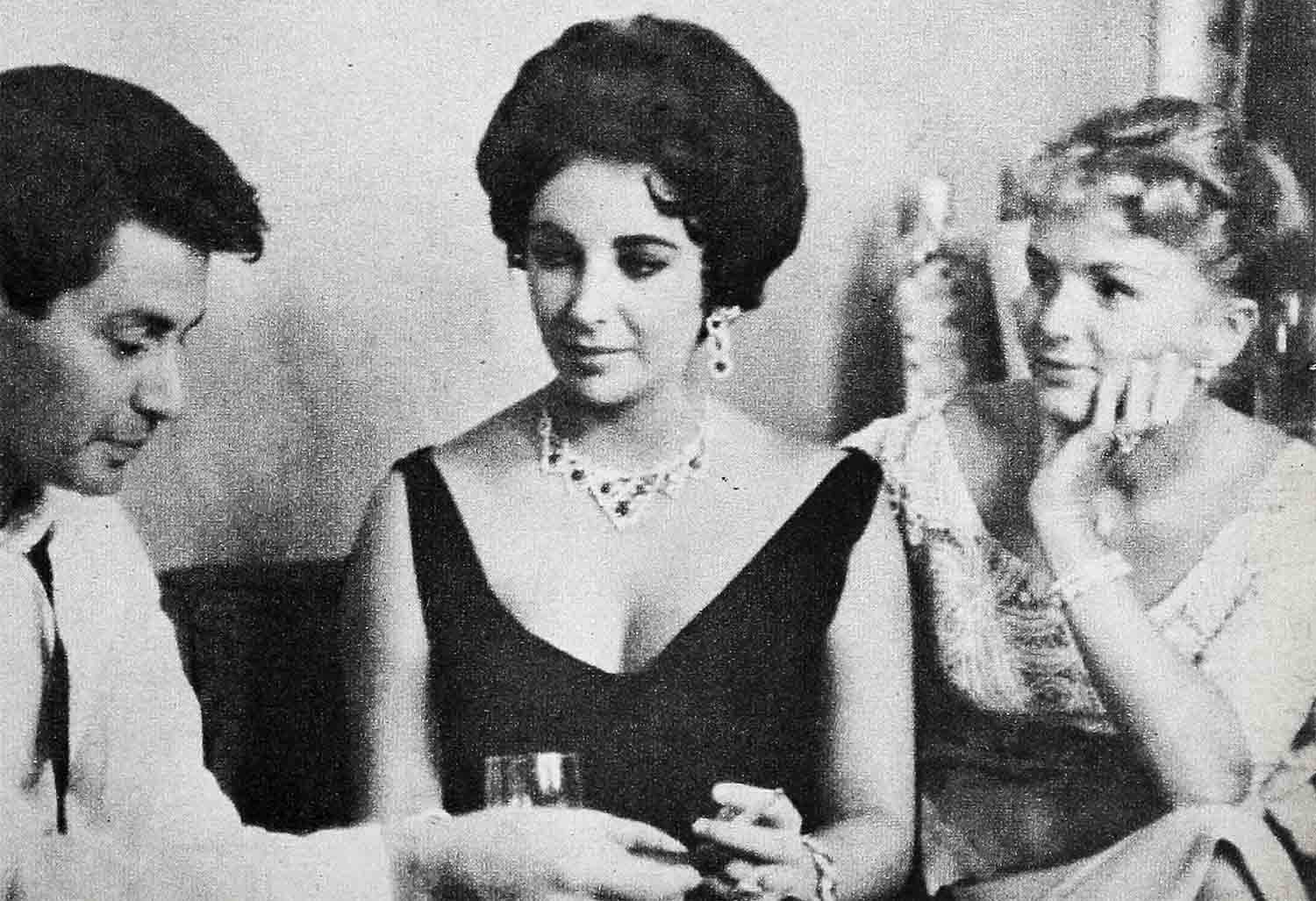
Some months before Todd was born, Eddie had a week off, after a continuous grind of shows. Since Debbie was busy on a picture they decided that it would be wise for him to get a complete rest by spending the time at their Palm Springs house. The only mistake Eddie made was to take Joey along. Aside from their sleeping hours they never got away from the chess board, and during the week a fine altercation was generated when Eddie won ten straight games and jokingly refused to let Joey forget it.
“There was one thing in which Eddie was better than I, and this I admit,” Joey Foreman says. “Eddie was a charmer. It worked with all kinds of people but what burned me up of course was that it seemed to work with girls I wanted to impress. He knew the right thing to say and had it said while I was still fumbling around for a word. It’s like a challenge to him to win people over. I don’t know anyone who has ever met him and talked long enough to get his views who hasn’t fallen for him.”
Eddie Fisher wants to be LIKED! Perhaps more than anything else in the world he wants to be liked. The trouble is—he wants to be liked by everyone!
He’ll never turn down an interview, always show up for a benefit show, help his old friends, stand in awe of those who were stars before him and give them their due and constantly and continually charm the pants off every man, woman, child and animal he comes in contact with.
And what happens?
He wears himself thin.
He wears himself out.
And then he has to retreat into himself—friends call it “his moods”—to regain the strength to face the ordeal of being an all around good guy.”
It’s enough to wear anyone out, let alone a person who’s in the public eye, surrounded by a staff constantly and besieged by fans, writers, sponsors, song pluggers and on and on.
A good friend of his once said that Eddie had a tendency to listen to everyone who had access to his ear and base his judgment on what he was told. He was afraid if he turned his ear he might loose a friend.
Yet he can be as stubborn as they come once he has actually disagreed with someone and more often than not it takes a third person to try and patch up the rents and tears in some friendship that Eddie professes to value so highly.
When Eddie had a serious falling out with his old pal, Bernie Rich, it was Debbie who brought them together. Not by trying to make Eddie see that he might possibly have been in the wrong but wisely—by maintaining her friendship with Rich’s wife Margie. Eventually Eddie and Bernie drifted back together again.
Eddie has had a number of these altercations with Bernie, just as he does with Joey Foreman and others. Each break, each misunderstanding seems to wear him down just a little bit more. He seems to be determined to be liked—but liked on HIS terms.
If Eddie and Debbie were having trouble—could this desire, or better still this craving to be liked—have anything to do with it? Could Eddie be spreading himself so thin that he just didn’t have the energy left to cope with the problems—the everyday problems that we must all face—in his personal life at home with Debbie?
“Life is more fun at home than anywhere else,” Eddie had said. Yet, two people with different interests, outlooks and temperaments have to work pretty hard at a marriage, no matter how much in love they are.
“It takes a pair of youngsters more docile than show people could ever be to live in marriage over a period of years and not disagree at times,’ Bernie Rich had remarked. “Eddie and Debbie have been known to have domestic rows. Eddie has a tendency to moodiness when things are not going well with his show and related enterprises; he will worry about a word of criticism and then closet himself up as he tries to fathom the reason for it. And Debbie, after all, is a young mother whose days can go as wrong as any young mother’s.
“When they are both out of sorts,” Bernie went on, “the same thing can happen with them as happens to any young couple. But the truth is that they are more bothered by the stories of their fighting than the fights themselves. And one thing they are adamant about—what happens between them stays in the family.”
Debbie is a girl who much prefers her own home, her two infant babies, her garden and her constant reading of novels and scripts nightly in front of a fire or in a corner of the nursery.
Eddie loves all this very dearly but he must also get out with people, travel, shake hands, listen, talk, and make friends.
Debbie saves her energy for her work, her small and close circle of friends, her home and family—her few interests.
But Eddie expends more than he has. He wears himself out. He gives, gives, gives to everyone and anyone and being only human—he has to explode, he has to let down, he has to gain back the strength that has made him the personality he is and he has to go into “his moods.”
Home would seem the best place. At home there is comparative privacy. At home one doesn’t have to work at being liked because one is loved. Home is safe and secure and home is—Debbie.
But a marriage must be worked at at all times and by two people. Strength has to come from both sides—maybe a different kind of strength—but both must give.
Thinking of all this I watched Eddie run through a song and he put as much into it as if he were performing in front of a TV audience. When he finished he was obviously out of his mood and his old self again. He smiled and joked and waved to me as if he were seeing me for the first time. I waved back somewhat foolishly feeling as if I were involved in some sort of a game where I didn’t know what the exact rules were.
Perhaps that’s what I’d sensed when I’d first come in. Maybe everyone was on edge until Eddie arrived. What would he be like? How would he feel today? This skinny young man who wanted to be liked by the world but who was very tired. Maybe the feeling I had gotten from the script girl, the prop man, the friend was the same one that Debbie greeted Eddie with every night when he walked in the door. If that were really so—it was too bad. But Eddie had said he’d never been happier in his life and that was going to be my story. If they’re in love it had to work out. All the rest was just a matter of growing up—of growing WITH a relationship. And marriage is the most important of all relationships—it was worth working at above all else.
Eddie had said he realized this all over again when Mike had died. Big Mike Todd was a man Eddie had worshipped and he’d been flattered when Mike seemed to depend on him. Seeing Liz and her kids left alone, Eddie had made a silent prayer. “Keep our family safe and sound. Keep us together. . . .”
Eddie had flown with Liz to the funeral in Chicago. Mike had been his best friend and he was helping his widow through this terrible time. Debbie had quickly agreed to take care of Liz’ kids during the first terrible days after Mike’s death. “After all,” Eddie said, “Liz is just about Debbie’s best friend.”
The four of them had had such good times together, wild, crazy, laughing times. Mike was always turning up with fabulous gifts for Liz and Eddie, not to be outdone, kept showering Debbie with gifts, too. He’d bought her a full-length mink and three mink stoles, a diamond watch, diamond earrings, a diamond pendant and pin, a T-bird, a Continental, charms in pearls, gold, sapphire and jade by the dozen. Debbie had protested these extravagances, but Eddie kept following his impulses and buying her gifts.
When their son was born, Debbie and Eddie named him Todd after their friend. “Mike would have liked you,” Eddie whispered to his infant boy. Then, delighted at having a son, Eddie went out to choose a diamond and pear! bracelet for Debbie.
The lights dimmed and Eddie walked towards me—hand extended. The big grin on his face made me feel good and I knew the story would be good.
“Had a lot on my mind before, rehearsals always get me,” he explained as he sat down and sprawled his legs out in front of him.
“You want to know about Debbie and me? There’s nothing to know. We couldn’t be happier. Debbie’s not only just happy as a wife and mother, she’s busy and happy. If I happen to remind her she’s also got a career as an actress she looks at me with blank eyes for a minute as if she’d forgotten about that altogether. Debbie’s world is full of her babies, her new house and, if you’ll pardon the expression—ME!”
“Is it true that when Debbie was pregnant you had a telephone installed in your car so you could be in touch with her all the time?”
Suddenly the smile faded and a peculiar expression appeared on his face.
“I got the idea from Mike—Mike Todd. He had one in his car. The day it was installed I made the first call to Debbie to see how she felt and then I called Mike. I knew he was out driving and I thought it would be a kick talking to him from one car to the other. Do you know what that guy said to me?”
Eddie’s tight lipped expression relaxed into a smile.
“I said, ‘Mike this is Eddie. I’m calling you from my car.’ And do you know what Mike answered? He said—
“ ‘Hold it a minute, Eddie—my other phone is ringing. . . .’ Then, after we’d talked, Mike said, the way he did if he was talking to me from Moscow, Paris or his car, ‘I love ya.’ ‘Me, too,’ I shouted back at him before he could hang up.”
Eddie looked down at his hands and then up again.
“He was a great friend. I liked him and you know—he liked me.”
I thanked Eddie and told him I had all the information I needed.
“I just wanted to see you and get the mood of the story. I wanted to make sure there was no basis for the rumors going around.”
He turned a violent pink and looked down at me as he pushed his chair back.
“I’ll say the same thing to you I said to a certain columnist, who shall remain unnamed, when she printed I’d moved out on Debbie just before Todd was born. I asked her how she could dare run such an item like that when we were just about to have another baby. And you know what she said to me? She said she had a reliable source for her information. They always say that. Well, I’ll tell you exactly what I told her. What more reliable source is there than ME?”
The production man appeared from the wings and told Eddie he had a long distance call waiting.
We shook hands and as I watched him walk off I put my Debbie and Eddie love story into place in my mind.
Halfway across the stage Eddie stopped and turning around called to me above the low din of the orchestra warming up.
“Don’t forget what I said. When you want the truth—call me. What more reliable source can you have than me if you really want the truth? You can always get me.”
That was two weeks before he flew to New York.
I haven’t been able to reach him since.
—L. POLLOCK
WATCH EDDIE ON NBC-TVS “THE EDDIE FISHER SHOW,” TUESDAYS AT 8:00 P.M. EST.
It is a quote. PHOTOPLAY MAGAZINE DECEMBER 1958
Why Elizabeth Taylor Turned To Eddie Fisher?



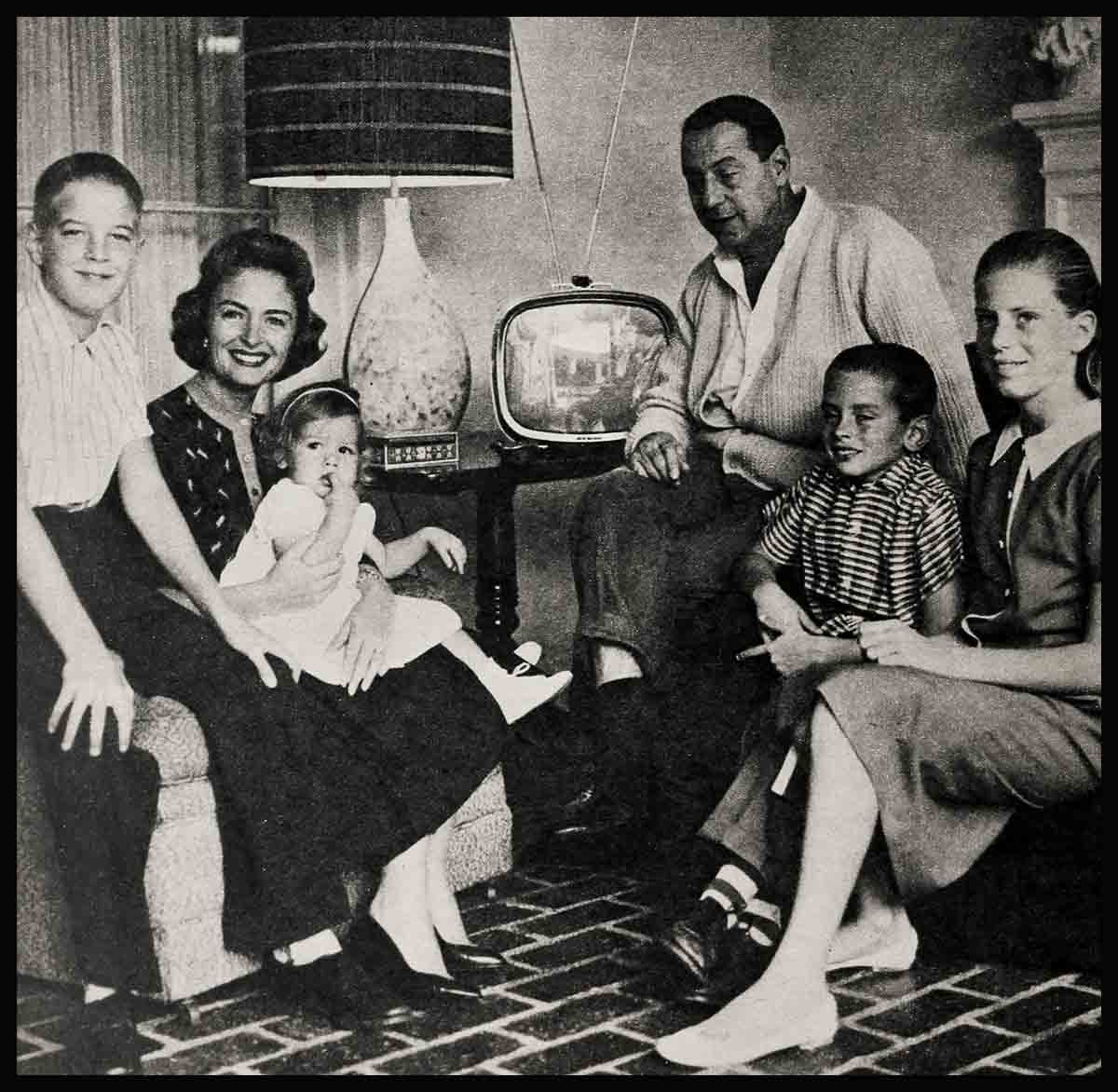
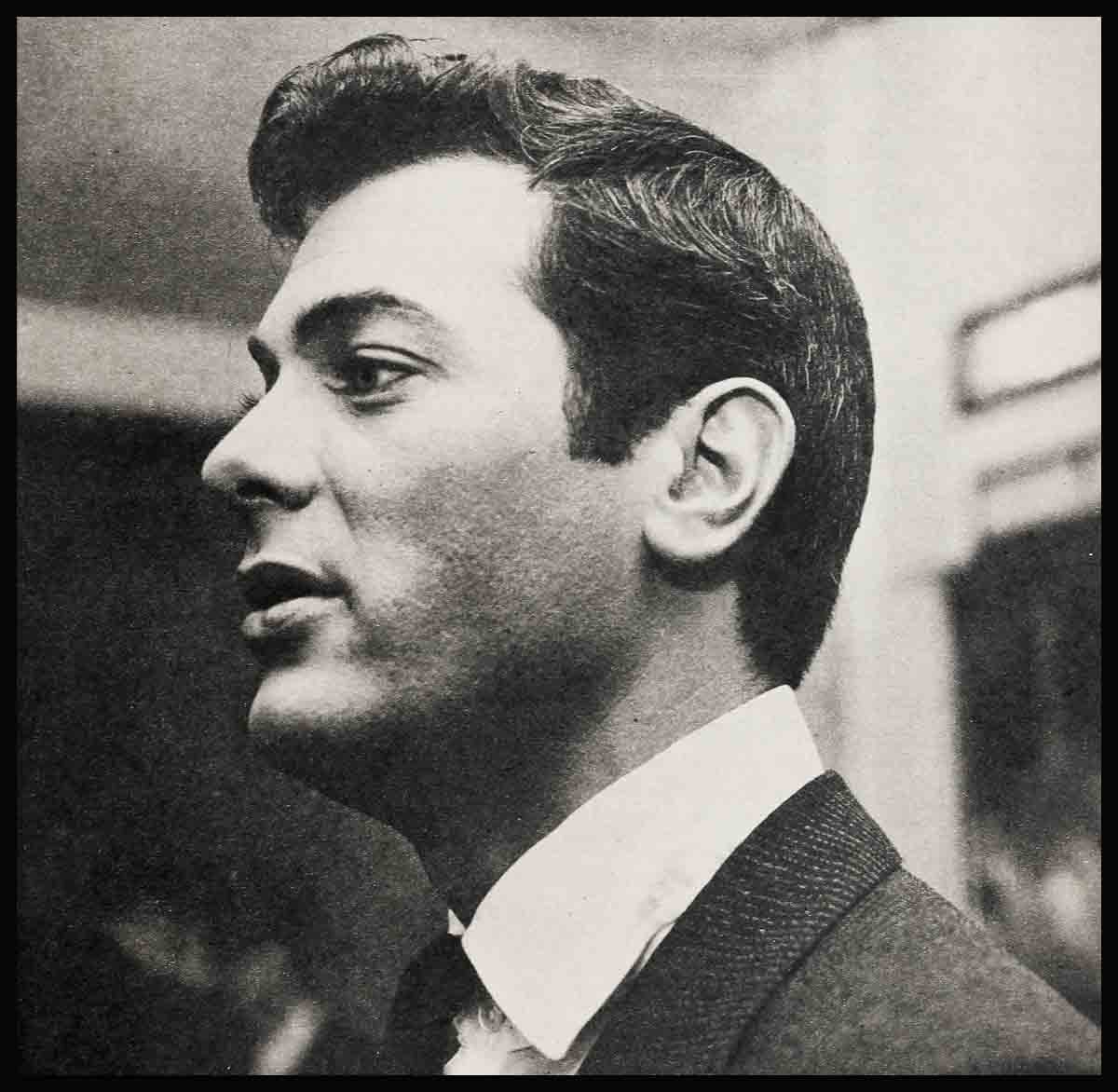
No Comments